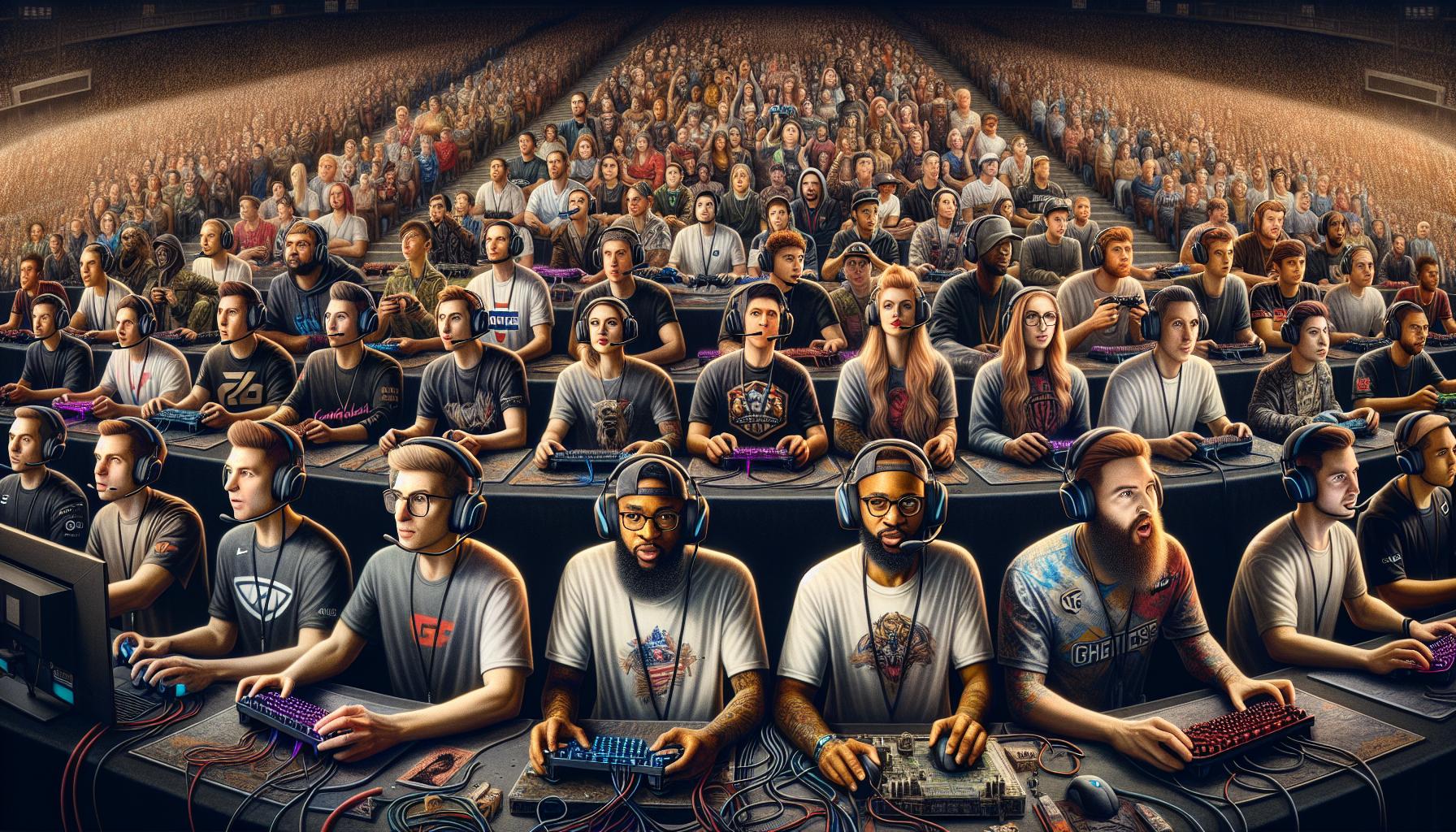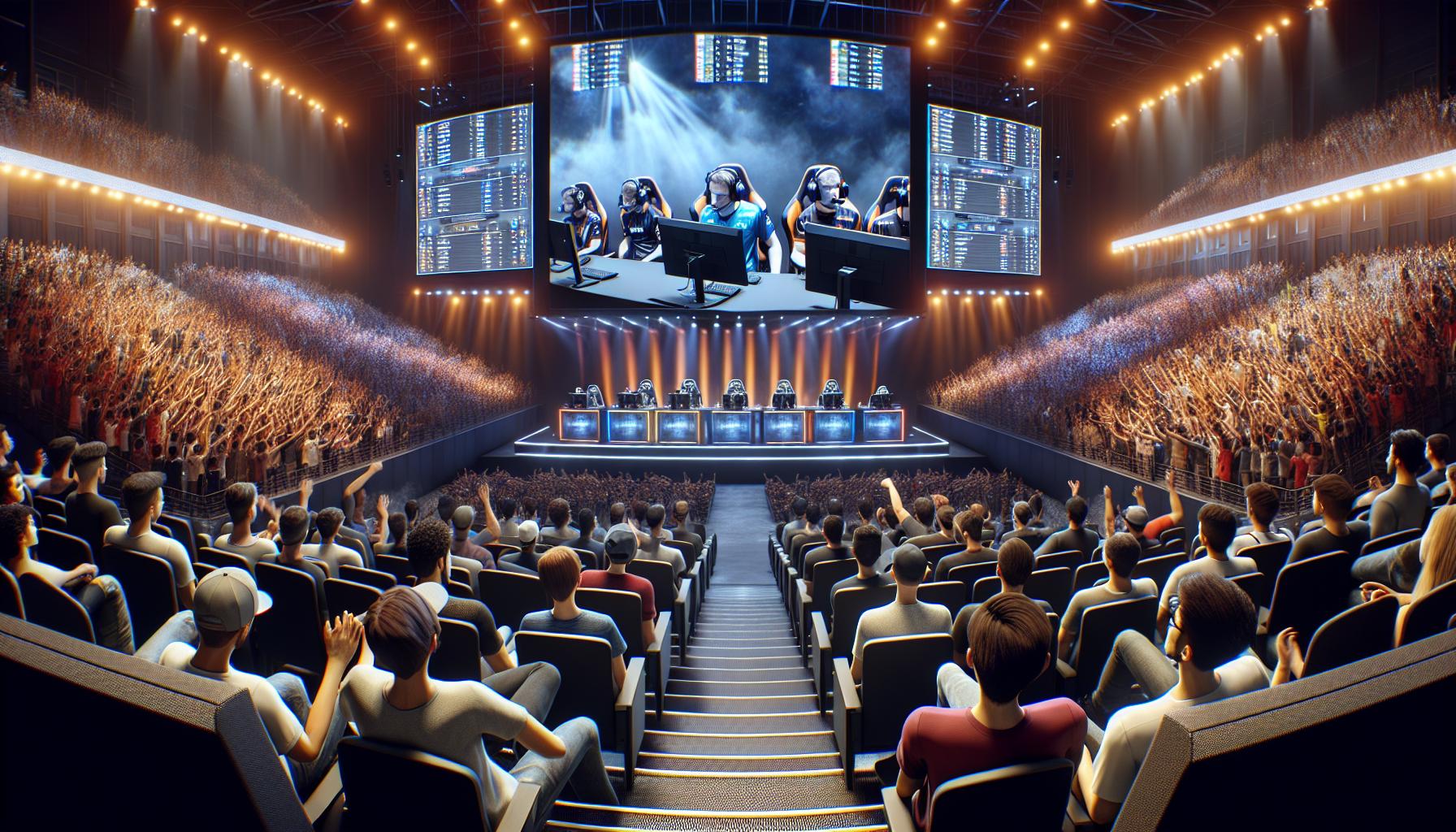
Gaming and esports have exploded into a global phenomenon, captivating millions and turning casual players into dedicated fans. Whether it’s battling in a virtual arena or strategizing with teammates across the globe, the thrill of competition and community keeps players coming back for more. Who knew that sitting on the couch in pajamas could lead to epic showdowns and life-changing tournaments?
As the lines between traditional sports and gaming blur, esports has carved out its own niche, complete with massive tournaments, sponsorships, and even college scholarships. It’s not just a hobby anymore; it’s a legitimate career path for many. So grab your controller, put on your headset, and dive into the electrifying world of gaming and esports—where every click could lead to glory or a spectacular faceplant.
Gaming and Esports
Gaming and esports represent a rapidly evolving industry that captures millions globally. Competitive gaming encompasses organized competitions featuring professional players and teams. Various genres, from first-person shooters to real-time strategy games, attract diverse audiences.
Esports events, such as the League of Legends World Championship and The International for Dota 2, showcase top talent and offer multi-million dollar prize pools. These tournaments draw thousands of attendees and millions of online viewers, building immense community engagement.
The appeal of gaming extends beyond just competition. Social interaction thrives in multiplayer environments, fostering a sense of belonging among players. Online platforms enable individuals to connect, discuss strategies, and build friendships through shared interests.
Major sponsors recognize the potential of esports and contribute significant funding. Brands like Intel, Red Bull, and Coca-Cola leverage this growth by collaborating with teams and tournaments. Investments fuel esports expansion, leading to professional organizations and leagues.
Colleges and universities are increasingly offering scholarships for esports talent. Institutions highlight the importance of strategy, teamwork, and communication skills in competitive environments. This recognition further legitimizes esports as a viable career path for aspiring players.
The rise in streaming platforms like Twitch and YouTube Gaming enhances visibility for both casual players and dedicated professionals. Viewers can watch live gameplay, gain insights from successful players, and engage in real-time chats. These platforms create communities united by a shared passion for gaming.
Ultimately, the interplay between gaming and esports shapes culture and behavior in the digital age. As technology advances, the landscape will continue to evolve, presenting new opportunities for players, fans, and stakeholders.
Evolution of Gaming

The landscape of gaming has undergone profound changes over the decades. Players have embraced various formats, leading to innovations in gameplay and community engagement.
Early Beginnings
Arcade games sparked interest in the 1970s and 1980s. Titles like “Pong” and “Space Invaders” introduced players to interactive entertainment. Home consoles emerged, with systems such as Atari 2600 capturing widespread attention. Gaming quickly became a popular pastime, leading to the creation of iconic franchises. Nintendo’s “Super Mario Bros.” transformed gaming culture, establishing a foundation for future developments. Early multiplayer experiences began with simple local connections, laying the groundwork for expansive online play.
The Rise of Competitive Gaming
Competitive gaming gained traction in the late 1990s and early 2000s. Events like Quake and StarCraft tournaments attracted dedicated participants. Further legitimizing the scene, organizations began to form around popular games. Games such as “Counter-Strike” pioneered the esports movement, leading to large-scale competitions with significant prize pools. Over 30 million viewers watched the League of Legends World Championship in 2020, highlighting esports’ growing popularity. Professional teams emerged, fueling fan engagement and creating a vibrant culture around competitive play. With the establishment of leagues and sponsorships, the gaming landscape shifted from casual enjoyment to a thriving industry.
The Esports Industry

Esports represents a dynamic sector within the gaming landscape. It features organized competitions that captivate audiences globally through a range of popular titles.
Major Esports Titles
League of Legends dominates the esports scene, offering competitive leagues with significant global followings. Dota 2, known for its International tournament’s massive prize pool, draws in millions of viewers annually. Counter-Strike: Global Offensive maintains a strong player base, showcasing intense gameplay in major events. Fortnite, recognized for its unique battle royale format, attracts diverse audiences and players of all ages. Call of Duty continues to evolve, with its annual installments captivating competitive gamers worldwide. Each title fosters dedicated communities, contributing to a vibrant esports culture.
Prominent Esports Organizations
Team Liquid exemplifies success in multiple game titles, with a robust roster of skilled players. Cloud9 holds a prominent position in North America, excelling in various esports. Fnatic represents Europe, known for its strong performances across different gaming genres. T1, based in South Korea, has gained fame through its League of Legends and Hearthstone teams. G2 Esports, recognized for its strong fan engagement, has made significant impacts in multiple competitions. Organizations like these drive the industry forward, promoting talent and enhancing visibility within the esports ecosystem.
The Impact of Gaming and Esports

Gaming and esports significantly influence social dynamics and the economy worldwide. These areas foster connections between individuals while transforming community engagement.
Social Connections and Community Building
Multiplayer gaming environments create opportunities for social interaction among players. Communities form around shared interests and experiences in popular games like League of Legends and Fortnite. Gamers often form lasting friendships through online collaboration and competition. They participate in forums and social media platforms to discuss strategies and share gameplay highlights. Many gamers find a sense of belonging within these communities, transcending geographical barriers. Strong connections frequently emerge through organized tournaments, enabling players to meet face-to-face. Such experiences contribute to a vibrant culture that values teamwork, communication, and support.
Economic Contributions and Sponsorships
The esports industry generates significant economic impact through sponsorships, events, and merchandise sales. Major companies invest in esports, recognizing opportunities to reach younger demographics. Brands like Intel, Red Bull, and Coca-Cola allocate substantial budgets for team sponsorships and event hosting. Tournaments offer substantial prize pools, attracting top talent and elevating viewer engagement. College scholarship programs support aspiring players while expanding academic opportunities. The growth of streaming platforms creates additional revenue sources through advertising and subscriber fees. Overall, esports contributes billions to the global economy, stimulating job creation and innovation in digital entertainment.
Challenges in Gaming and Esports
Various challenges affect the gaming and esports landscape. These obstacles influence players, organizations, and the community as a whole.
Mental Health Considerations
Mental health plays a critical role in gaming and esports. Many players face stress due to high competition and the pressure to perform. Anxiety can increase when gamers are scrutinized by audiences and sponsors. Depression may result from isolation during extensive gaming sessions, disrupting social interactions. Support systems and resources for mental wellness become essential to help players navigate these challenges. Awareness campaigns can foster understanding among fans and organizations regarding mental health topics. Providing access to mental health professionals within the esports environment can enhance overall well-being.
Regulatory and Ethical Issues
Regulatory challenges shape the gaming and esports industry. Different regions impose varying laws related to gambling, age restrictions, and content management in games. Compliance with these regulations influences event organization and sponsorship agreements. Ethical considerations also arise from player conduct, including cheating and harassment. Establishing clear codes of conduct promotes fair play and respectful interactions among participants. Furthermore, developers and organizations can collaborate to form industry standards, ensuring alignment with ethical practices. Addressing these issues not only builds trust but strengthens the integrity of the esports ecosystem.
The Future of Gaming and Esports
The future of gaming and esports promises exciting developments that will reshape the landscape. Emerging technologies continue to enhance the player experience and audience engagement.
Emerging Trends and Technologies
Cloud gaming grows in popularity, allowing players to access high-quality games without expensive hardware. Virtual reality, or VR, creates immersive experiences, transporting players into dynamic environments. Mobile esports has gained traction as smartphones become powerful gaming devices, fostering competitive play on-the-go. Additionally, artificial intelligence personalizes gameplay and enhances matchmaking systems, improving overall user experience. These trends set the stage for a more integrated and innovative gaming environment.
Predictions for Growth
The esports market is projected to reach $1.5 billion by 2023, driven by increasing viewer engagement and sponsorship deals. Participation is expected to rise, with estimates suggesting 600 million esports fans globally by 2024. Major brands continue to invest, further legitimizing esports as a viable career path. The growth of collegiate esports programs will enhance talent development, introducing more players to professional gaming opportunities. As technology advances, the potential for new revenue streams and experiences expands, reinforcing esports’ position within the entertainment industry.
The Journey of Gaming
The gaming and esports landscape continues to evolve at an unprecedented pace. As technology advances and communities grow, the excitement surrounding competitive gaming only intensifies. Players and fans alike are embracing the unique experiences that esports offer, from thrilling tournaments to engaging live streams.
With substantial investments and increasing recognition from educational institutions, the future looks bright. The industry’s potential for new revenue streams and innovative experiences is boundless. As esports solidifies its place in the entertainment realm, it promises to captivate audiences and inspire the next generation of gamers. The journey of gaming is far from over, and its impact will resonate for years to come.
